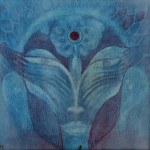An Age has Passed me By

An interview with Pir Md. Kawwal of Fatehpur Sikri
In one corner at the Darwaaza to Salim Chistis’ Dargah, I found an old man sitting with his harmonium and singing. Singing beautifully. You could listen to him singing all day, raagas and kawwalis, and weave fantasies made of kings and queens, musicians and courtesans, of an era gone past. The old man’s name is Pir Muhammad. He sings in Salim Chishtis’ Dargah to earn a living, just as his ancestors used to sing in Akbar’s court. His ancestors would get a patronage of one rupee a month, and today he gets the same from the Government of India - a monthly allowance of one rupee. To see Fatehpur Sikri through his eyes and hear his story, as he took me around, singing all the while, was a treasured experience.
“My name is Pir Muhammad ‘Kawwal’. I live in Fatehpur Sikri. I am about 70 years of age. I sing in Salim Chishti’s Dargah and have been singing for a long time now. This is my job, my profession. (Yahi mera kaam hai, yehi mera pesha hai.)
Since the time of Akbar, my ancestors have been court singers. There was Maula Baksh in Akbar’s court. He was a great singer. During the same time and age that Mia Tansen used to sing in Akbar’s court, my great grandfathers used to play the tabla and the pakhawaj and sing on the tanpura. When the Mughal rein ended and the British rule started, we were assigned to Salim Chishti’s Dargah.
In Akbar’s time, our ancestors were paid a salary of Rs. 1.25. There used to be 52 servants in Salim Chishti’s Dargah. There were kawwals, nakkare wale, singers, sweepers, and gardeners, and there was a Brahmin bellman. In those days a Rupee had great value. The coins were made in silver. One rupee could buy 5 tons of grain and even though today it has no value, the same salary continues. Since the Government of India came into being, it continued the patronage, but even that stipend has not been coming in for the last 30 years. The darogah used to get Rs. 10 a month, the munshi Rs. 5 a month, other workers got Rs. 4 each, the water man - Rs. 2, the gardener - 50 paisa, and I used to get Rs. 1.25.
It is only because of the tourists who leave token amounts of appreciation, that I can sustain myself. People are happy to listen to my songs. All kinds of people come, kings and ministers and foreign tourists. In the British times, there were less travelers - not many people came to see the Taj, or the Agra fort or Fatehpur Sikri, but since Hindustan and Pakistan separated, a lot of tourists come, from all over the world. The times have changed now. (Ab daur badal gaya hai, na.)
I have become old now. Who knows how God made me! (Maalik ne mujhe jane kya bana ke bheja.) I have always suffered ill health - in my childhood and youth and old age. I had 6 sons and all of them died, not a single one survived. Two girls survived and I married them off. I stayed with my parents in poverty and ill health. I did not have enough money to get myself treated by doctors or hakeems. My parents and ancestors left all the property for my cousins. They didn’t leave me anything because I had no children. So bitterness grew within the family and we went our separate ways. I don’t even have any elders or children to take care of. (Mere aage peeche bhi to koi nahi hai.) Our families are still feuding and even take to violence at times.
We are artists but we struggled for two meals a day. At that time, others had permission to sing but I was without a permit. There was no one to help me. Even the caretaker went against me. He doesn’t want me to sing but I don’t listen to him. If the tourists come, I sing. Why should I not sing? I have proof that I am a servant of the Dargah. That is how I make a living. I have no other means of earning. These days a lot of tourists come so I can make a comfortable living. Whatever I earn is enough to feed and clothe me.
I have letters written to me by ministers and some from district magistrates. Some people send photos. In 1980, Indira Gandhi had come here. I have a photograph with her. But I never got that photograph. I tried a lot, wrote letters to Delhi but they did not send me that photograph. Though I don’t have that photo, it is there, that photo with Indira.”
As Pir Muhammad ‘Kawwal’ sits at the Darwaaza of the Dargah and sings a bandish -“An age has passed me by since the time I have been sitting at your doorstep. Listen to my prayers, O Lord!” (Tere dware pade jug beet gaye, meri araj suno, Khwaja Salim.) - the mind is drawn into the corridors of history, and the life of this seemingly common man who has seen the past, and is living the present to tell the tale.




Leave a Comment